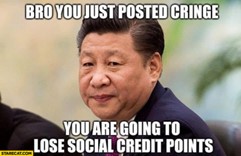Did a friend post 'cringe' on their social media account? This post unpacks the meaning and origin of this expression.
Meaning
The expression 'cringe' refers to a person's actions or video content that makes you feel uncomfortable or embarrassed. A person could walk up to you and try to ask you out on a date, and they make you feel cringey with the way they drop pick-up lines and try to get you to come home with them.
Or, cringe can refer to content on social media that makes you feel embarrassed. The content has an edge of humor, but it makes you feel ashamed for the person because the situation is so bad. If someone is 'cringey,' they are not appealing to you, and you don't want to spend time around them.
Example Usage
"This guy just posted cringe on Reddit. He deserves someone calling him out for it. Let's everyone spam the comments and rip on him."
"You're not going to post that cringe, are you? Don't you know what that will do to your online reputation? Take it down before anyone sees it."
"Is there any way you could post something more cringe than that? What will people think of you when you post other stuff in the future?"
"I'm tired of reading through the cringe in this account. I will unfollow them and focus my attention on something else."
"That's so cringe, bro. Why have you got to post that nonsense? I like laughing, but that's just not cool."
"I swear, the next cringe post I read, I'm going to throw in the towel and quit watching the internet."
"Cringe is cringe, bro. If you want to post that stuff, that's on you. Don't expect other people to find it cool."
"My best friend posted cringe today. I unfollowed him and blocked him on all my social accounts. He's going to be upset, but I gotta do it."
“You’ve got to stop this habit of posting cringe on social media. People are going to end up trolling you for days. Run your posts past me before you publish them, okay?”


Origin
The expression ‘cringe’ originates from Middle English between 1175 to 1225. The original word is ‘crengen,’ or ‘crenchen,’ meaning to yield in battle. However, the modern use of the word appeared in the 2010s. The first record of the term referring to content or conversations that make you feel uneasy is in 2013.
Language experts cannot pinpoint the first use of ‘cringe’ in the English lexicon or who coined the term. However, many believe it came out of social media and chatrooms, where people would use it to reply to content that makes them feel uncomfortable or embarrassed.
The modern use of the word has nothing to do with the original meaning. It’s a common word used in social media interactions and IRL.
Phrases Similar to Cringe
- Uncomfortable.
- Uneasy.
- Embarrassing.
Phrases Opposite to Cringe
- N/A.
What is the Correct Saying?
- Cringe.
- Cringey.
Ways People May Say Cringe Incorrectly
The term 'cringe' is a slang adoption of the 'cringe' action. While it has a long history, the modern use of the expression refers to others people's actions that make you feel uncomfortable, not to the physical activity of cringing in horror or disbelief.
Acceptable Ways to Phrase Cringe
You can use the term 'cringe' when describing other people's actions that make you feel uneasy and uncomfortable. Typically, the phrase refers to watching online content that's 'cringe,' but it can also refer to real-life interactions with others.
For instance, if a guy walks up to you at drops a cheesy pickup line, you could say he's 'cringe.'' Or you could watch someone doing the same thing to a girl in a video and have the same reaction. The term suits use in social communications. You can use it in verbal exchanges or text-based communications to describe your response to someone's content or actions.